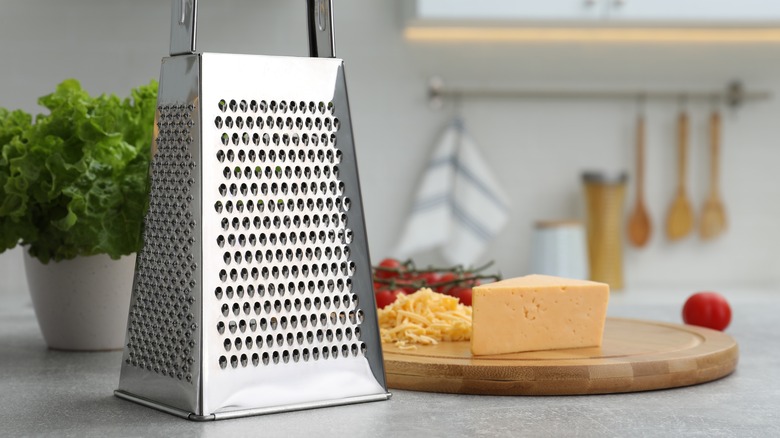The Lemony Cleaning Hack That Will Leave Your Cheese Grater Sparkling
Cheese graters: the best food-related invention or your arch nemesis? These tools can come in extremely handy when you need to grate up a tasty pile of cheese, but they are less friendly to your hands when you try to clean them. The clever design produces a tricky map of ridges and sharp blades that resists cleaning sometimes, leaving debris behind even after a good scrub. The holes can tear into some sponges, but with the help of a lemon, you can get your grater sparkling after every use, and avoid shredding your sponge, too! All you need is half a lemon, some salt, dish soap, and your sink!
Lemon is known for its antibacterial properties, which is why some people use it to clean around the house and cleaning solutions incorporate citric acid (found in lemons). Lemon hacks like stopping your garbage disposal from smelling and using lemon oil to clean your kitchen aren't the only way you can use this citrus around the house. While your cheese grater might not be the cesspool of bacteria that, say, your toilet can be, stuck-on food can still produce microorganisms and germs you don't want in your system. Getting this accumulation off is important, and a lemon half can serve to scrub your grater clean without damaging the metal.
Swap your scrubber for a lemon
Gather 2 to 3 tablespoons of salt and place in a bowl or plate. Cut a fresh lemon in half, and dip one of the halves into your salt. Holding the lemon half with the rind against your palm, use the fruit to scrub your cheese grater, carefully navigating it up and down both against and with the blades. Keep your fingers in mind while doing this so you don't cut them. Once you've scrubbed the grater several times, let the lemon remain on the surface for a few minutes. The citric acid will help with build up and will sanitize at the same time, and the salt acts as a natural scrubber. While you have the lemon and salt, give your cutting board a scrub too!
After letting the lemon work, put the grater under your tap with hot water and rinse. Then add dish soap to a microfiber cloth and gently pull it in the same direction as the blades to clean off any remaining lemon. You don't want to leave any of the citrus behind, either, because you'll just end up with more work down the line, and it could potentially rust your grater. Once the suds are gone, dry your tool with a clean towel. You can also add dish soap directly to the lemon instead of the salt. If you choose to try this, make sure to still rinse the grater with a fresh microfiber cloth to get all of the fruit off.
